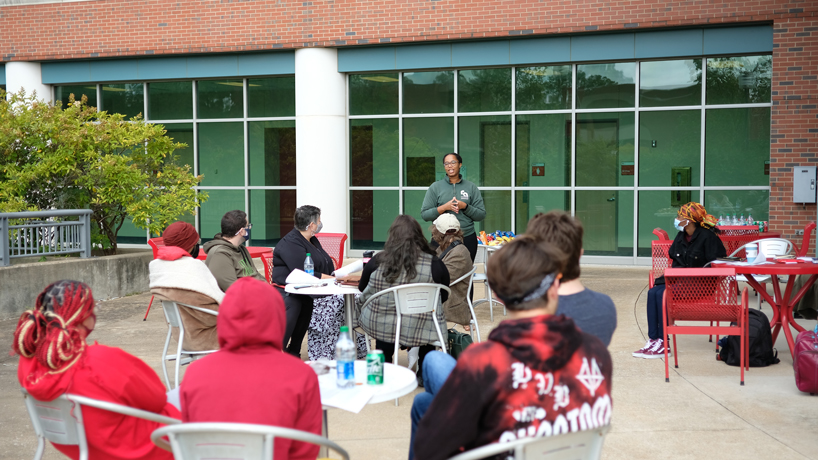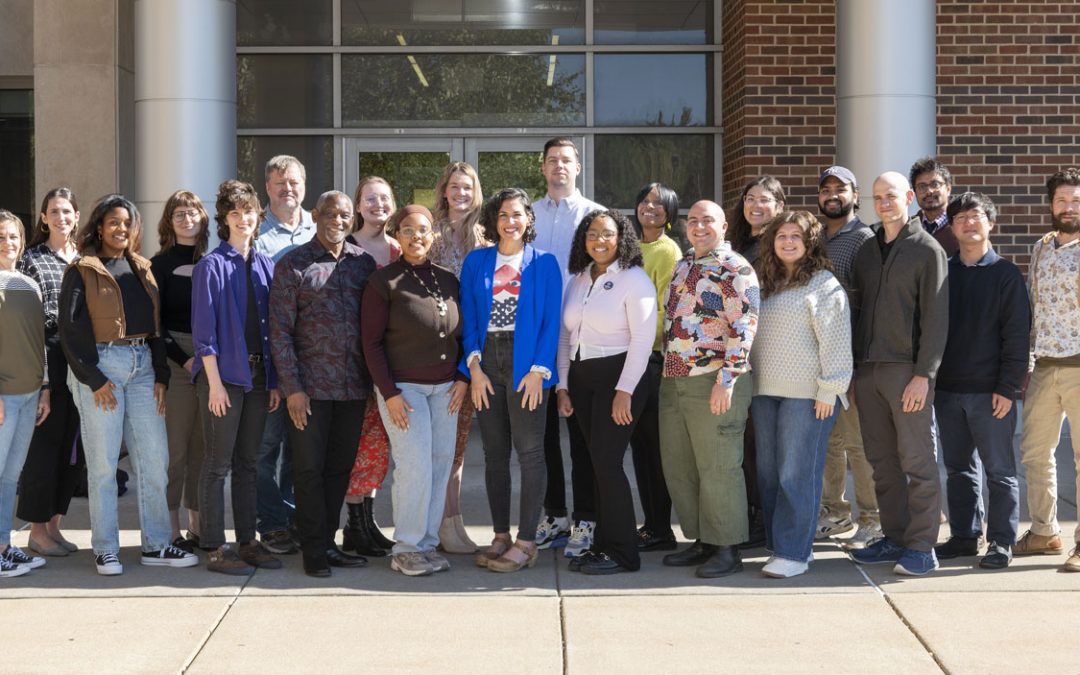
Assistant Teaching Professor Kim Welch addresses attendees at the Black Futurity Group’s first event of the year, “Transformative Question Series: What does social justice mean to you?” on Thursday. The hourlong session featured short “flash talks” by faculty members and students about their personal conceptions of social justice and breakout groups with freeform discussions on the subject. (Photo by Burk Krohe)
Nearly two dozen students, faculty and staff huddled around tables on the Millennium Student Center patio Thursday at the University Missouri–St. Louis, sharing ideas and conversing intently with each other.
The discussions were part of the Black Futurity Group’s first event of the year titled, “Transformative Question Series: What does social justice mean to you?”
Kim Welch, assistant professor of English, and Lauren Obermark, associate professor of English, led the event, which was sponsored by the Department of History and the Department of English.
Welch, Obermark and Kara Moskowitz, associate professor history, organized the group in the wake of the murder of George Floyd and the subsequent civil unrest of 2020. Welch said English faculty members started thinking about a statement of solidarity with the Black Lives Matter movement but wanted to go a step further.
“We want to make sure that we have actions that backup what we say,” Welch said. “So this Black Futurity Group came out of that. It started as a reading group, but then we decided that reading isn’t enough. We’re thinking about other actions that we can do, as well.”
Initially, the group only held virtual events due to COVID-19 precautions but still found creative ways to engage members of the UMSL community. Last year’s events included a storytelling performance by MFA alumnus and author of “Shrimp” Jason Vasser-Elong and a screening of an episode of the Netflix show “Dear White People” followed by a discussion.
The focus of each meeting differs, but the overall goal is to foster discussion across campus around Black life and Black experiences and raise awareness about the ways some actions can unintentionally contribute to continued injustice.
Thursday’s hourlong session was the group’s first in-person event and featured short “flash talks” by faculty members, including Welch and Obermark, and students about their personal conceptions of social justice. The talks were followed by breakout groups in which participants held freeform discussions about issues surrounding social justice.
Jayla McDonald, a junior English major, has been active in the group since last year and moderated the discussion after the screening of “Dear White People.” McDonald got involved with the group after taking one of Welch’s classes, where she was inspired by the Black texts and Black conversations Welch built into her curriculum.
Ashli Miller, an English graduate student, was also motivated to participate by Welch, as well as Obermark. Miller said they empowered her to have discussions about social justice outside of class and bring what she’s learned to other students.
“I think talking about things that we don’t usually talk about in class or in other curriculums, it’s something that feels very transformative,” Miller said. “I feel like it encourages me to show up more as a student.”
The group discussions touched on a variety of topics including the positive and negative role social media plays in social justice, the influence of pop culture and importance of forging connections with people of different backgrounds, while simultaneously working to education oneself.
McDonald and Miller’s group focused on what white instructors and students can do to be accountable in supporting Black students. McDonald said it was encouraging to create a space for Black voices and to be heard.
“I actually got a chance to talk with one of the social movement professors and really show her what it’s like from a Black female perspective, me and another student, on how to create a conducive classroom where we can integrate Black stories into the curriculum and the Black experience and perspective into everyday life on campus,” McDonald said.
Sometimes the conversations can be uncomfortable, but Welch knows they’re vital.
“One of the reasons it’s so important is thinking about where we’re situated in St. Louis and thinking about our student population,” she said. “UMSL is a PWI, a predominantly white institution. Frequently the demographics of faculty don’t match the representation that we have in our student population. So we’re thinking about spaces that are inclusive, and also thinking through these hard conversations about equity, diversity and inclusion.”
Despite the potential for discomfort, Welch noted that UMSL students seem eager to learn about topics such as the history of racism in St. Louis and are comfortable pushing back on unrepresentative curriculum. She added that seeing engaged students is energizing and motivates her to continue the Black Futurity Group’s work.
Miller is hopeful that these conversations will become more common on campus.
“I think the important thing about the Black Futurity Group is it doesn’t just have to be us,” she said. “It can inspire other organizations to do the same and make it more of a norm.”
The Black Futurity Group will continue to hold a mix of virtual and in-person events throughout the school year. The next event,“Lunchtime Documentary Watch Party & Discussion of ‘Talking Black in America’” is scheduled for Nov. 15.
For more information on future events visit: sites.google.com/umsystem.edu/umslenglishantiracistaction/black-futurity-group














